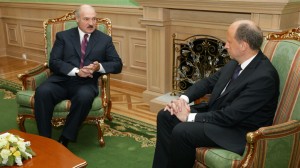
Lukashenko (left) and Kubilius talk Monday in Minsk. Lukashenko confirmed that his country would like to build a gas pipeline from Klaipėda to Belarus. Photo by the Belarusian Presidential Office.
MINSK, Belarus — Belarusian President Aleksandr Lukashenko said his country wants in on Lithuania’s soon-to-be-constructed floating gas terminal, which will liberalize both nations’ gas import possibilities.
Belarus is now keenly aware of the benefits of diversifying its gas sources following last week’s spat with Moscow over the payment of a gas bill. Russia, via the state-owned gas company Gazprom, cut supplies to the country by 30 percent, squeezing Belarus into paying their bills immediately.
During a meeting with the Lithuanian Prime Minister Andrius Kubilius in the Belarusian capital Minsk, Lukashenko confirmed that Belarus would like to build a gas pipeline from Klaipėda to Belarus and that they would like to take part in the building of the floating liquid natural gas import terminal.
“Lukashenko confirmed that Belarus is interested in the liquefied gas terminal in Klaipėda, considering the possibility to participate in its development. He talked about a possible gas pipeline from Klaipėda,” Kubilius’ spokesman Virginijus Valentinavičius told the Baltic News Service from Minsk.
For an unknown reason, the meeting between the two politicians lasted for just 30 minutes, instead of the planned 90.
Lukashenko ensured Kubilius that energy security had become one of the country’s top priorities, putting the country in a similar position to Lithuania.
Kubilius echoed the sentiments of Belarus’ desire for more energy security.
“We all know what it means to be dependent solely on any single supplier’s resources, it is sometimes problematic. To have an alternative, governed by economic logic is good,” Kubilius said. “This approach [shows] we have good opportunities to develop clear and effective projects. In this way we can strengthen our independence and sovereignty.”
Lukashenko also revealed during the meeting that his country was planning to continue importing oil from Venezuela to wean itself of Russian supplies.
Kubilius said via his aide that he thinks Belarus is sincere in its attempts to align itself with the west and with the EU. He did however warn Lukashenko that Lithuania’s — and the EU’s — support hinges on democratic systems being installed in the country and human rights issues being addressed.
In a tacit admission of guilt over past elections, which have not been up to international standards, Lukashenko told Kubilius that he could win a “democratic election.”
In addition to Lukashenko, called “Europe’s last dictator” by the U.S., Kubilius met with members of dissidents while in the country who have faced persecution by the Belarusian regime.
This article is free to view. To read Baltic Reports’ subscription-only articles, click here.













As a Lithuanian citizen, I would welcome Belarus to discover what “the shoe is on the other foot” REALLY means.
But I would have to agree with the little dictator. In a “democratic election” between Kubilius and Lukashenka, Lukashenka does indeed have a good chance.